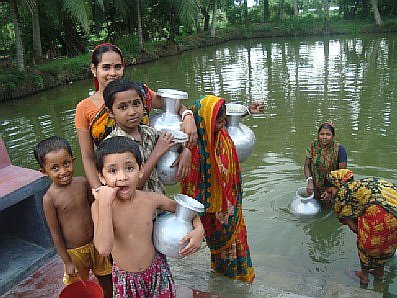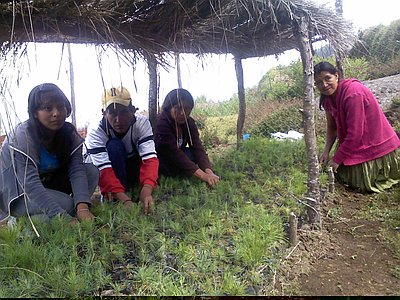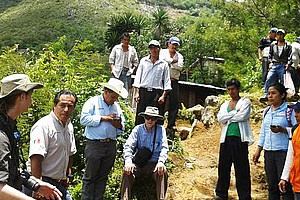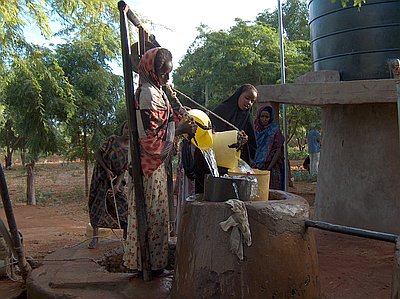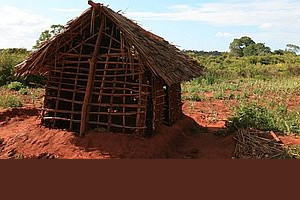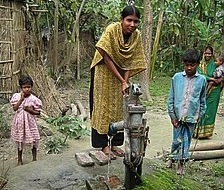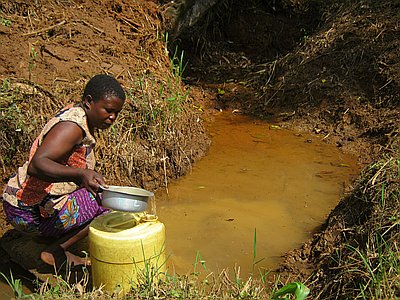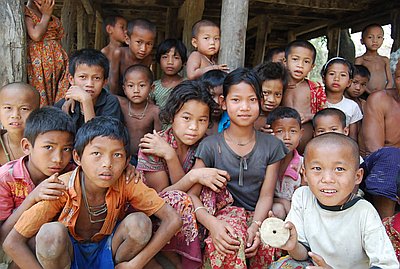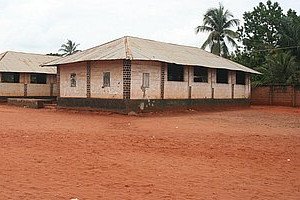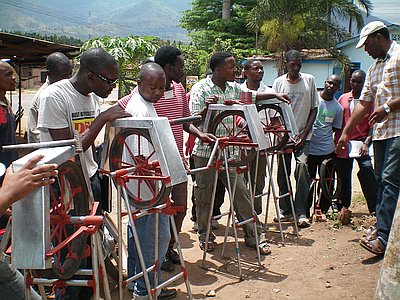Difference between revisions of "Hygiene and Health focused promotion"
(→Field experiences) |
(→Field experiences) |
||
| Line 77: | Line 77: | ||
|'''Akvo RSR Project:''' [http://wandelenvoorwater2014.akvoapp.org/en/project/467/ Community Water and Sanitation Project] | |'''Akvo RSR Project:''' [http://wandelenvoorwater2014.akvoapp.org/en/project/467/ Community Water and Sanitation Project] | ||
The aim of this project is to help improve water, sanitation & hygiene in three primary schools & the Ukpo hospital & provide hygiene education to the school/hospital management. In each of the project sites, one borehole, two compartments of 3 toilets (3 male/3 female) linked to one VIP toilet and a set of hand washing stations will be put in place. Positive changes expected from the project include constant water supply, cleaner environment for the children, improved health & hygiene education. | The aim of this project is to help improve water, sanitation & hygiene in three primary schools & the Ukpo hospital & provide hygiene education to the school/hospital management. In each of the project sites, one borehole, two compartments of 3 toilets (3 male/3 female) linked to one VIP toilet and a set of hand washing stations will be put in place. Positive changes expected from the project include constant water supply, cleaner environment for the children, improved health & hygiene education. | ||
| + | |} | ||
| + | |||
| + | |||
| + | {| style="width: 70%; text-align: justify; background-color: #f5f5f5;" | ||
| + | |[[Image:rsr 340.jpg|thumb|none|200px|<font size="2"><center>Project 340</center></font>]] | ||
| + | |'''Akvo RSR Project:''' [http://wandelenvoorwater2014.akvoapp.org/en/project/340/ Water training centre in Malawi] | ||
| + | This project focuses on training local businesses that will produce and sell new low cost water solutions that are affordable for (groups of) households. Demand and investments will be stimulated through social marketing and with the help of the Watsan Centre of Excellence. The goal is to establish a sustainable and competitive supply sector that offers a wide range of low cost water options (pumps, filters, etc) that can deliver water for middle and low income families. | ||
|} | |} | ||
Revision as of 04:18, 19 October 2013
A Plan India supported animation film
on "WASH" (in Hindi)
Hygiene and Health-focussed promotion refers to promotional activities which take the hygiene and the health of the user as the main focus in promotion activities, as contrasted to, for example, increased status from the use of a branded product, multiple use promotion, or appealing to emotions such as disgust, as in the case of Community-Led Total Sanitation. Hygiene and Health-focused promotion is in many places the conventional approach to promote better sanitation and water services and to stimulate demand for improved services.
Hygiene is behaviour which serves to prevent illness. Hygienic behaviour also helps to keep people and their environments clean, ordered and attractive. Three practices have been shown to be particularly effective: handwashing with soap, the removal of sanitation products from the household environment, and the home treatment of drinking water. Each of these interventions has been shown to reduce the incidence of diarrhoeal diseases by about 35% 1 An excellent overview of Hygiene promotion is available at WELL factsheet - Hygiene promotion at the WELL website, which provides common falacies, key principles and many references.
Hygiene promotion as a component of a complete package
Hygiene promotion is most effective in combination with improved, affordable, and accepted water and sanitation interventions 2. One reason for this is that although hygiene promotion can also improve health in the absence of improved facilities, it is often the improvements in sanitation and water facilites, such as a pit latrine instead of open defecation, or a tippy tap for hand washing, which enable the new hygienic behaviour.
For this reason, priority should be given to making hygiene promotion a separate component of a complete water and sanitation programme. This can also be reversed: improvements in The Hygiene Improvement Framework 3, for example, uses a combined approach consisting of Access to Hardware (water supply systems, improved sanitation facilities, etc.), an Enabling Environment (Policy improvements, community organization, financing, etc), and Hygiene Promotion (Communication, Social mobilization, community participation, etc.).
Hygiene as part of broader health campaigns
Focus on health promotion for water, sanitation and hygiene to stimulate improved services and practices can also be combined with broader health campaigns. A good example is the 'Blue Star' ('Estrella Azul') campaign developed in Nicaragua, in which the local ministries of Health, Education and the National Water Supply agency, worked together with many local NGO's, and with technical support from USAID's Environmental Health Project and John Hopkins University4, 5
Behavioural change and the private sector
Changing behaviour is very difficult. Companies are very succesful at changing behaviour, as the very succesful efforts to get soap in almost every household around the world show. Therefore, knowledge sharing between the public sector, the private sector and NGO's can be very beneficial, and Public-Private Partnerships are a good possibility here. This type of cooperation has been the basis of the Global Public-Private Partnership for Handwashing6.
Field experiences
| Akvo RSR Project: Life-WASH
Similar to natural disasters, the project area is severely affected with excessive saline intrusion both in the groundwater and surface water mixed with unacceptable level of iron and arsenic (in the groundwater). The project will directly benefit 3350 households to have a solution regarding the problems of safe drinking water, sanitation and hygiene. |
| Akvo RSR Project: MWA-LAP: Guatemala
CARE will implement the program in Guatemala, concentrating activities in the Department of San Marcos which is in the Western Highlands of the country as can be seen in the accompanying map. This area is characterized by limited access to safe water – 40% of the rural population lack access. Access to improved sanitation facilities is similarly low -- 48% of the rural population lacks access. |
| Akvo RSR Project: MWA-LAP: Mexico
Two MWA partners – Living Water International (LWI) and World Vision (WV) – will implement the program in Mexico. In total, the two partners will reach over 88,000 largely underserved and indigenous populations in rural Southern Mexico in the States of Puebla, Oaxaca, Chiapas and Veracruz with access to integrated WASH services. |
| Akvo RSR Project: Safe water for Wajir
WASH promotion in Makaror a suburb of Wajir Town through technical education and demonstration of WASH. Wajir is constructed on top of an ancient aquifer. Wajir has 130.000 inhabitants by 2013 and has a growth rate of 10 percent per year. Most wells have ecoli pollution. Lining wells helps. Closure and pump installation is better. Combination with Ecosan is an adequate solution. |
| Akvo RSR Project: Water, Food & Sanitation for School + Community
The school and catchment area is the main focus. Connect the school to the mains water supply + storage tank. Three toilet blocks with handwash facilities. The provision of a water pan with pump to provide water for drinking and cooking; drip irrigation for crop cultivation on the school farm and income generation to maintain the project. Complete training for the community. |
| Akvo RSR Project: WaSH program in Rural Bangladesh
Considering the unhealthy and unhygenic environment in rural school and community in southern part of Bangladesh, PSTC will initiate WaSH for schools and communities. lt ensures drinking water and sanitation both in school and community by installing hardware in selected school and areas. In addition, hygiene promotion is done through group meeting/courtyard meeting in school and community. |
| Akvo RSR Project: Rwenzori Integrated School WASH Project
HEWASA and JESE will jointly implement this 3-years school WASH program in Kabarole district in the West of Uganda. Not only 24 schools will be supplied with WASH facilities (Rainwater Harvesting Tanks, Ecosan Latrines and Handwashing facilities) but 72 surrounding communities will be included for household latrine construction through CLTS, hygiene and health education and promotion. |
| Akvo RSR Project: Community-led WASH and Safe Motherhood
To enable 32717 extremely poor people including Ethnic Minority Groups (Men Women and Children) of 6218 households living in hard to reach areas in Lama Upazila in Bandarban district moving towards healthy life through access to WASH and safe motherhood. |
| Akvo RSR Project: Community Water and Sanitation Project
The aim of this project is to help improve water, sanitation & hygiene in three primary schools & the Ukpo hospital & provide hygiene education to the school/hospital management. In each of the project sites, one borehole, two compartments of 3 toilets (3 male/3 female) linked to one VIP toilet and a set of hand washing stations will be put in place. Positive changes expected from the project include constant water supply, cleaner environment for the children, improved health & hygiene education. |
| Akvo RSR Project: Water training centre in Malawi
This project focuses on training local businesses that will produce and sell new low cost water solutions that are affordable for (groups of) households. Demand and investments will be stimulated through social marketing and with the help of the Watsan Centre of Excellence. The goal is to establish a sustainable and competitive supply sector that offers a wide range of low cost water options (pumps, filters, etc) that can deliver water for middle and low income families. |
External links
- WELL factsheet - Hygiene Promotion
- WELL factsheet - Health impact of handwashing with soap
- WELL Briefing Note - Making hygiene promotion cost effective
- Background report to WELL Briefing Note on Making hygiene promotion cost effective
- Media/Materials Clearinghouse - a resource for health communication materials. Safe Water Communication section
- Hygiene Central – the website of the Hygiene Centre at the London School of Hygiene & Tropical Medicine
- Scott, B., Curtis, V., Cardosi, J. (2005) The handwashing handbook: a guide to developing a hygiene promotion programme to increase handwashing with soap. World Bank, Washington
References
- ↑ WELL factsheet - Hygiene promotion
- ↑ The value of hygiene promotion, WELL background study
- ↑ The Hygiene Improvement Framework - a comprehensive approach for preventing childhood diarrhea. Produced by EHP, USAID, Worldbank/WSP, WSSCC
- ↑ . [1]
- ↑ Blue Star multimedia materials on the information on the Media/Materials Clearinghouse
- ↑ Global Public-Private Partnership for Handwashing website
